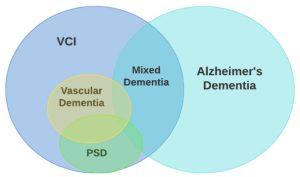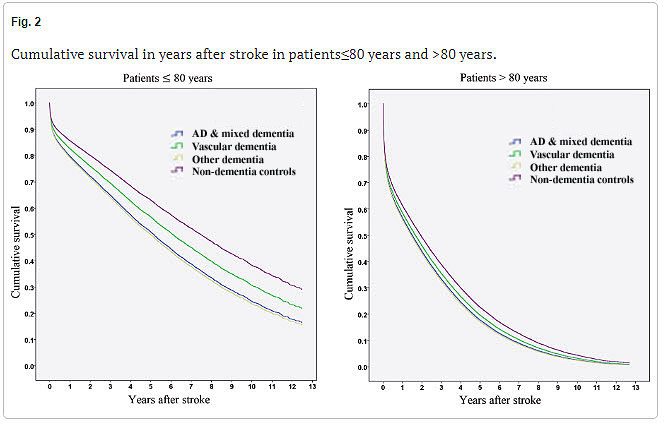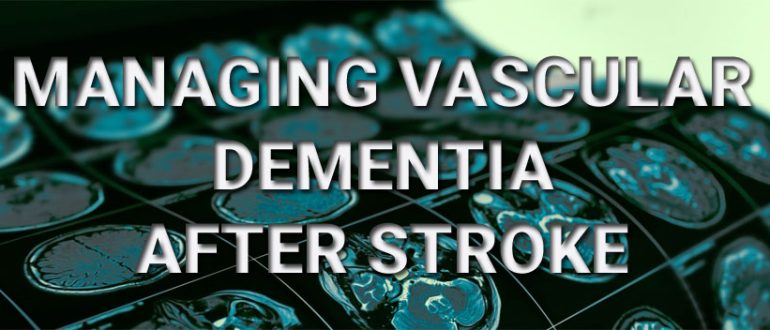 Each year there are more than 100,000 first-time strokes in the UK; and as you may have heard on the news a couple of weeks ago, this number is set to rise by 50% by 2035.
Each year there are more than 100,000 first-time strokes in the UK; and as you may have heard on the news a couple of weeks ago, this number is set to rise by 50% by 2035.
And as you know, stroke often brings with it lots of complications. Current evidence suggests that a full 25–30% of ischaemic stroke survivors develop immediate or delayed vascular cognitive impairment (VCI) or vascular dementia (VaD). This is in no small part due to the high percentage of strokes happening to those who are more elderly at the time of stroke. Here in the UK, the average age for men to have a stroke is 74 and for women, the average age is 80 years old. 10% or more of stroke patients may have existing vascular dementia.
Vascular dementia is the second most common form of dementia after Alzheimer disease (AD). The condition isn’t a single disease; it’s a group of syndromes relating to different vascular mechanisms.

Although most patients with post-stroke dementia have vascular brain lesions that explain the cognitive impairment, some patients have concomitant neurodegenerative diseases.
A national longitudinal cohort study 2007–2017 using Swedish national registries was conducted to analyse predictors of death after stroke in patients with dementia and investigate possible time and treatment trends (Zupanic at al 2021).
12,629 ischemic stroke events in patients with dementia with matched 57,954 stroke events in non-dementia controls in different aspects of patient care and mortality. Patients with≤80 years with prior Alzheimer’s disease or mixed dementia showed higher mortality rates after stroke compared to patients with prior vascular dementia.
Because over time, areas of brain cells stop working, the symptoms of vascular dementia are similar in presentation to other cognitive deficits following a stroke and there can be strong overlaps. The reason vascular dementia is classified separately from cognitive impairments is because it’s caused by brain damage from impaired blood flow to the brain.
Besides disability in stroke survivors, vascular cognitive impairment (VCI) can prevent these patients from living independently. Memory loss, confusion, language problems, difficulty paying attention or following a conversation, difficulty planning and organising tasks, difficulty with calculations, making decisions, solving problems, visual orientation problems, hallucinations and impaired motor skills are all known symptoms. associated with disability, dependency (including institutionalism) and morbidity (people with vascular dementia who have had a stroke have a 5-year survival rate of 39%). Major depression is also a widely observed mood disorder in vascular dementia. So, vascular dementia is most usually frustrating for not just the survivor, but trying to help them.
Although it doesn’t have a ‘cure’ at the moment, there ARE increasingly customised ‘battle-plans’ that can be created for survivors and their carers-givers by experts in dementia. The goal of these is to help survivors and manage symptoms and helping those who help them.
 Click to read My Choice; a newly released information resource (April 2024) designed to help people live well with dementia.
Click to read My Choice; a newly released information resource (April 2024) designed to help people live well with dementia.
(ARNI Contribution: p. 14 covering the area of physical activity).
See also news article https://arc-kss.nihr.ac.uk/news/new-resource-launched-to-help-live-well-with-dementia
- Continually staying active mentally has been shown to improve memory and communication skills.
- Participating in physical activities, acquiring a healthy diet and eliminating smoking and alcohol consumption have all been shown to improve symptoms of vascular dementia.
- Managing current morbidities or conditions such as high blood pressure, diabetes and obesity can also prevent progression of vascular dementia.
- Furthermore, social functioning is often reduced as a result of vascular dementia, so joining a social group which has meaning for the person rather than one which is too different and unfamiliar, can help.
- Connecting with others, along with practicing social skills, is posited to help with the feelings of isolation post-stroke.
- Interactive apps can help too, dependent upon the person’s presentation/status: see current examples below
MindMate is a free app, available for Apple, Android, and computers, offers brain games and workouts to help with attention, memory, problem-solving, and cognitive speed. MindMate also features other tools to stimulate brain and general health, promoting good nutrition, physical exercise, mental stimulation, and social interaction. The site allows you to take a memory test online and promptly emails you your results.
Constant Therapy is an app for dementia patients available for smartphones and tablets. Offering cognitive, language, and speech therapy, it is designed to support patients with Alzheimer’s and dementia, as well as those recovering from brain injuries including stroke. The award-winning programme was developed by scientists at Boston University and adapts to keep patients challenged, but not frustrated. Subscribers have unlimited access to a library of brain rehabilitation exercises. There is also a version available for clinicians to use with their patients.
Piano with Songs is a free app for people  struggling with memory issues, who may find music therapeutic and relaxing. It lets users play the piano, even if they haven’t played it in years (or ever), for free. With a library of thousands of songs, people with Alzheimer’s and dementia can use the app to access old favourite songs and unlock good memories in the process.
struggling with memory issues, who may find music therapeutic and relaxing. It lets users play the piano, even if they haven’t played it in years (or ever), for free. With a library of thousands of songs, people with Alzheimer’s and dementia can use the app to access old favourite songs and unlock good memories in the process.
Alz Calls is quite an interesting addition. Caregivers of people with dementia are familiar with the repeated phone calls and questions from a frightened loved one who needs the reassurance of hearing their voice. Unfortunately, many caregivers are not always available to provide this reassurance due to work and other obligations. This app is basically a chatbot designed for patients who repeatedly ask for their family, struggle with transitions to new environments, or need social interaction. Family members can record their voice, add a photo that will pop up for the patient to recognize, and answer frequent questions so that the patient can have an interactive conversation when the caregiver is not available to talk.
Spaced retrieval therapy is an app to help patients with dementia often have trouble retrieving information they have recently heard or seen. Tactus Therapy offers apps for cognition and language problems, including spaced retrieval therapy to help patients remember new information longer using evidence-based memory techniques. The app is available for $4.99 for both Android and Apple devices.
Lumosity is one of the earliest brain-training apps developed, and it continues to be popular after more than ten years, with over 100 million users. The app’s scientists create fun, challenging, easy-to-learn brain games based on established cognitive training exercises. The app boasts peer-reviewed studies that show that it improves cognition. Available on Apple and Android as well as online, Lumosity costs $14.95 per month, but costs go down significantly if you subscribe for a year or longer, and lifetime subscriptions are also available.
Real Jigsaw Puzzles is a great free app, available on Apple and Android, for seniors who enjoy jigsaw puzzles and could use some brain stimulation. Jigsaw puzzles are great for entertainment and promoting focus, but they take up a lot of space, and they’re not very portable. With this app, one can choose from a wide variety of puzzles and the number of pieces per puzzle is adjustable from 9 to 1000.
AmuseIT is an app designed to promote conversation; isolation can be a problem for those living with dementia, and it can be difficult for those who care for them to know how to engage. It contains over 1000 simple quiz questions with a strong visual component. In addition to facilitating a connection between dementia patients and caregivers who use the app, AmuseIT stimulates memory and reasoning and is easy to use, even for those intimidated by technology.
Word Search Colorful is an an uncomplicated, engaging, classic, free word search game available on Apple and Android which involves words hidden within blocks of letters; instead of needing to circle the words with a pen, a swipe of the finger provides a colourful highlight.
MEternally is a website that offers photo and activity cards, DVD, and other tangible tools to promote reminiscence for seniors with memory loss. The reason for this being available on a site and not a smartphone or tablet,is that there are many seniors with dementia who don’t have access to (or just are not interested in) using them. The site offers various collections, including themes such as Nature, Patriotic, and Favorite Things in an effort to help people make connections and share joy through reminiscence.
My Choice: led by Katherine Sykes MRes (ClinRes); PGCert (Dementia); BSc (Nursing), NIHR Applied Research Collaboration KSS / Health Innovation Network KSS, Associate faculty, Centre for Dementia Studies, Brighton & Sussex Medical School.
Zupanic, E. et al (2021). Mortality After Ischemic Stroke in Patients with Alzheimer’s Disease Dementia and Other Dementia Disorders. Journal of Alzheimer’s Disease, vol. 81, no. 3, pp. 1253-1261.
Kalaria RN, Akinyemi R, Ihara M. (2016). Stroke injury, cognitive impairment and vascular dementia. Biochim Biophys Acta. vol. 1862, no. 5, pp. 915-25.



